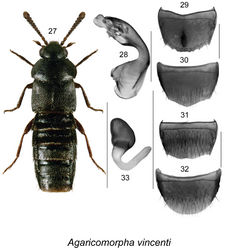Agaricomorpha vincenti\according to Klimaszewski et al 2016
| Notice: | This page is derived from the original publication listed below, whose author(s) should always be credited. Further contributors may edit and improve the content of this page and, consequently, need to be credited as well (see page history). Any assessment of factual correctness requires a careful review of the original article as well as of subsequent contributions.
If you are uncertain whether your planned contribution is correct or not, we suggest that you use the associated discussion page instead of editing the page directly. This page should be cited as follows (rationale):
Citation formats to copy and paste
BibTeX: @article{Klimaszewski2016ZooKeys, RIS/ Endnote: TY - JOUR Wikipedia/ Citizendium: <ref name="Klimaszewski2016ZooKeys">{{Citation See also the citation download page at the journal. |
Ordo: Coleoptera
Familia: Staphylinidae
Genus: Agaricomorpha
Name
Agaricomorpha vincenti Klimaszewski & Webster – Wikispecies link – Pensoft Profile
- Agaricomorpha vincenti Klimaszewski & Webster (2016).
Diagnosis
This species is distinguishable by its small body that is compact and narrowly oval in outline (Fig. 27); length 1.7–1.9 mm; uniformly black; forebody with strong microsculpture, that on elytra and abdomen forming scale-like structures, punctation coarse, sparse and flatly impressed, pubescence sparse and approximately evenly distributed on forebody (Fig. 27). Agaricomorpha vincenti may be readily distinguished from Agaricomorpha websteri Klimaszewski & Brunke by the differently shaped pronotum, which is much broader than the elytra (Fig. 27), by its uniformly black body, and by the shape of median lobe of aedeagus (Fig. 28), male tergite VIII (Fig. 29), and spermatheca (Fig. 33).
Distribution
| Origin | Nearctic |
| Distribution | Canada: NB, AB |
| New records | New provincial record: Canada, Alberta: Athabasca, 19 km N Calling Lake, 55.3046°N, 113.4848°W, Hammond window-trap, H-95-2-1, 1996.08.29, H-95-2-4, 1996.2.4, H-95-2-3, 1997.05.28 (NoFC) 1 male, 2 females; Smith, 10 km N Lawrence Lake, 55.0432°N, 113.6650°W, Hammond window-trap, H-95-3-1, 1997.08.11, H-95-3-6, 1996.09.24 (NoFC) 2 females. |
| Reference | Webster et al. (2016)[1] |
Natural history
In New Brunswick, specimens of Agaricomorpha vincenti were captured in Lindgren funnel traps in a rich Appalachian hardwood forest, a Populus tremuloides stand with a few conifers, an old-growth northern hardwood forest, and a hardwood forest on an island in a river. In Alberta, adults were captured in window traps attached to aspen snags in a boreal aspen stand harvested two years previously. Adults were collected during May, June, and July in New Brunswick, and in May, August and September in Alberta.
Comments
This species is probably continuously distributed from New Brunswick to Alberta and likely extends further to Alaska.
Taxon Treatment
- Klimaszewski, J; Langor, D; Hammond, H; Bourdon, C; 2016: A new species of Anomognathus and new Canadian and provincial records of aleocharine rove beetles from Alberta, Canada (Coleoptera, Staphylinidae, Aleocharinae) ZooKeys, (581): 141-164. doi
Images
|
Other References
- ↑ Webster R, Klimaszewski J, Bourdon C, Sweeney J, Hughes C, Labrecque M (2016) Further contributions to the Aleocharinae (Coleoptera, Staphylinidae) fauna of New Brunswick and Canada including descriptions of 27 new species. ZooKeys 573: 85–216. doi: 10.3897/zookeys.573.7016
